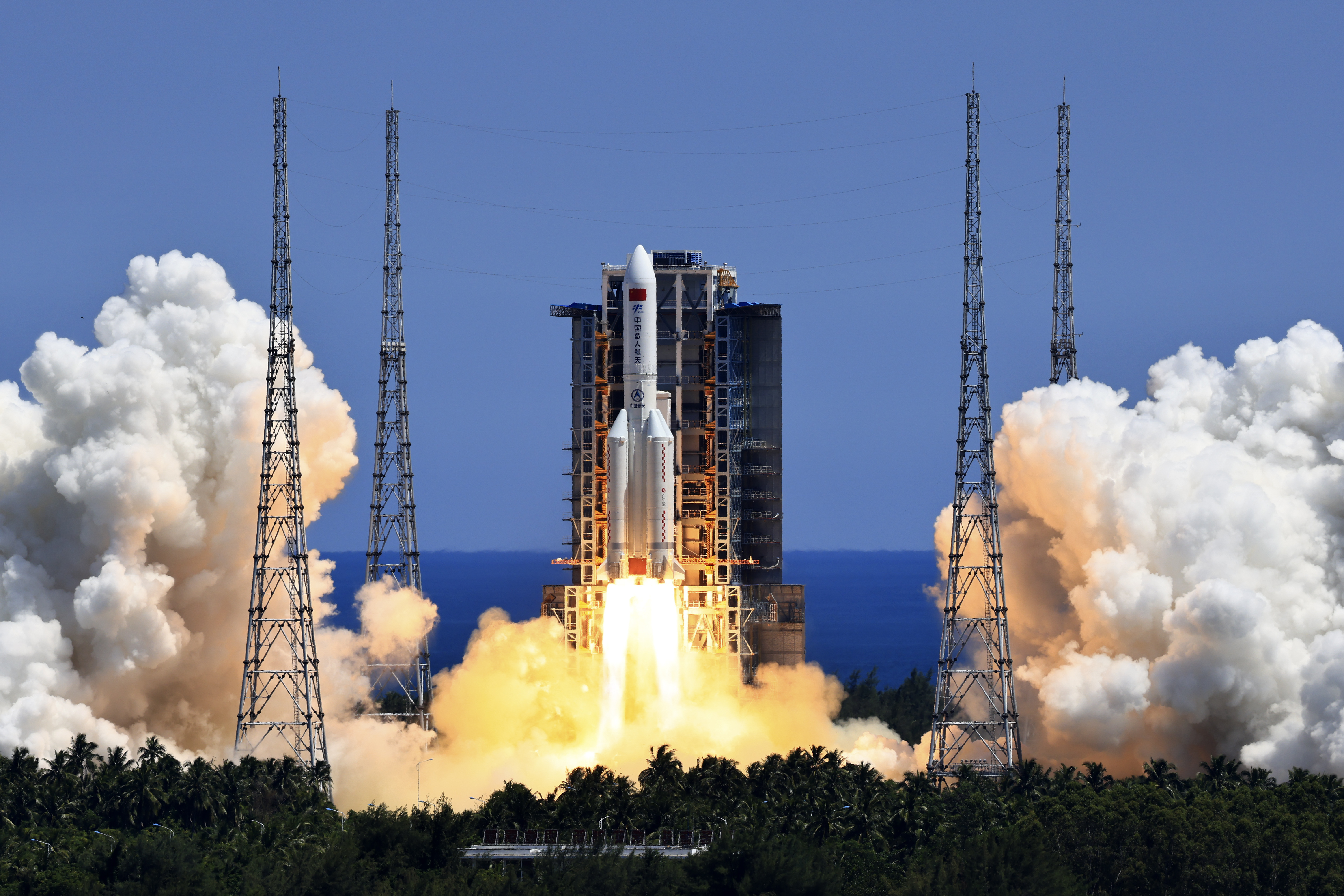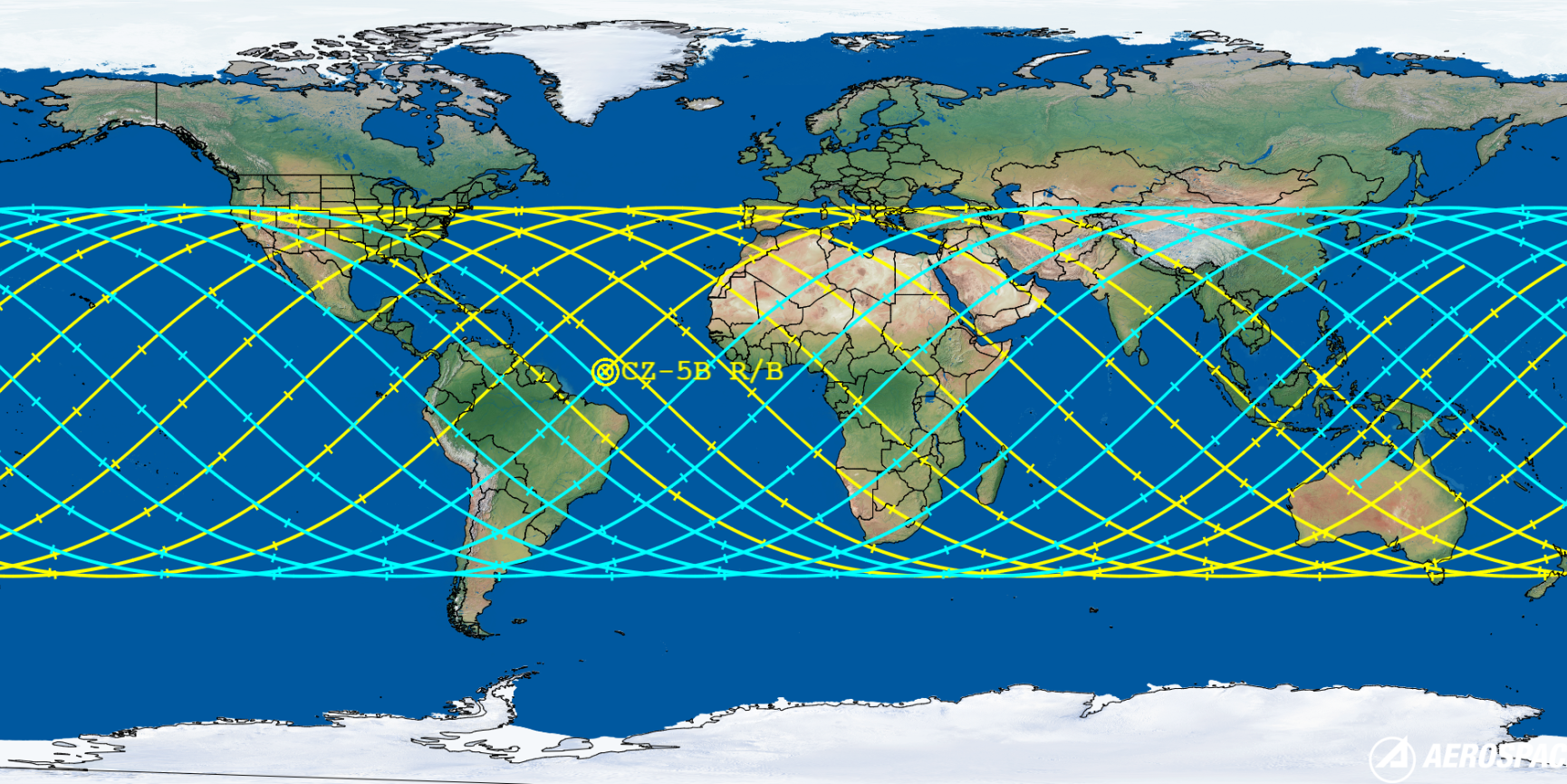Another huge piece of Chinese space junk is falling to Earth. 'Here we go again,' experts say
Another Chinese Long March 5B rocket body will once again plummet to Earth in the coming days above a yet-to-be-determined location.

Another Chinese launch, another uncontrolled rocket body reentry.
The China Manned Space Agency (CSMA) launched the third and final module of the Tiangong space station on Monday (Oct. 31) atop a Long March 5B heavy-lift rocket. As with previous Long March 5B launches, China did not perform a controlled deorbit of the rocket's core stage after its payload was deployed. That means that, yet again, a 23-ton (21 metric tons) Chinese rocket body will plummet to Earth above a yet-to-be-determined location in the coming days.
"For those who've been tracking the previous versions of this: Here we go again," Ted Muelhaupt, a consultant with The Aerospace Corporation's Corporate Chief Engineer’s Office, said during a briefing on Wednesday (Nov. 2) that discussed the upcoming space junk crash and what could be done in the future to prevent such incidents.
While Muelhaupt was quick to point out that "nobody has to alter their lives because of this," he also pointed out that "88% of the world's population is at risk, and so 7 billion people are at risk" from the Chinese space debris falling on them.
Related: Chinese launch next week will set stage for another big space-junk crash
The Aerospace Corporation's panel of experts made sure to note that they were not attempting to overhype the event or create panic. "The answer is that you've got far better odds of winning the lottery tonight than you are getting hit by this object," Muelhaupt said. "The risk to an individual is six per 10 trillion. That's a really small number."

This is far from the first of such incidents. In July, between 5.5 tons to 9.9 tons (5 to 9 metric tons) of another Long March 5B crashed into the Indian Ocean after surviving the fall through Earth's atmosphere. Another Long March 5B fell into the Indian Ocean in April 2021 after China's space agency did not perform a controlled deorbit. And in 2020, after the rocket's debut launch, pieces of the vehicle's core stage reportedly hit the ground in Ivory Coast.
Get the Space.com Newsletter
Breaking space news, the latest updates on rocket launches, skywatching events and more!
(Most rockets are designed such that their core stages ditch into the ocean or over unoccupied land shortly after liftoff, or come back to Earth for safe landings, in the case of SpaceX vehicles. But the Long March 5B core stage reaches orbit, and China lets it stay up until drag brings it down in an uncontrolled fashion.)
As more of these uncontrolled Chinese reentries occur, more and more voices are calling for the establishment of international laws or norms to prevent such incidents from happening. Marlon Sorge, Executive Director for The Aerospace Corporation's Center for Orbital and Reentry Debris Studies (CORDS), said during today's briefing that international laws are unclear when it comes to these types of reentries. "And the reality is there aren't any real laws, treaties, internationally that govern what you're allowed to do in terms of reentry," Sorge said. "So There isn't really a direct legal way to control what's going on on an international level."
For their part, neither China's national space agencies nor any other official government body has issued a response to The Aerospace Corporation's regular tracking of and communications about falling Long March 5B rocket bodies. Muelhaupt said that he is not aware of "any direct comment about Aerospace by the Chinese," although he has "seen general commentary about the West hyping this unnecessarily." Sorge said that the Chinese government "made some comments in the press at one point, but mostly not."
"I mean, really what Aerospace's point here is just to report on what's going on — make sure that people you know are informed; they understand they have a realistic view of what the situation is," Sorge added. "There's not really much to argue with there."
Follow Brett on Twitter at @bretttingley. Follow us on Twitter @Spacedotcom or on Facebook.
Join our Space Forums to keep talking space on the latest missions, night sky and more! And if you have a news tip, correction or comment, let us know at: community@space.com.

Brett is curious about emerging aerospace technologies, alternative launch concepts, military space developments and uncrewed aircraft systems. Brett's work has appeared on Scientific American, The War Zone, Popular Science, the History Channel, Science Discovery and more. Brett has English degrees from Clemson University and the University of North Carolina at Charlotte. In his free time, Brett enjoys skywatching throughout the dark skies of the Appalachian mountains.









